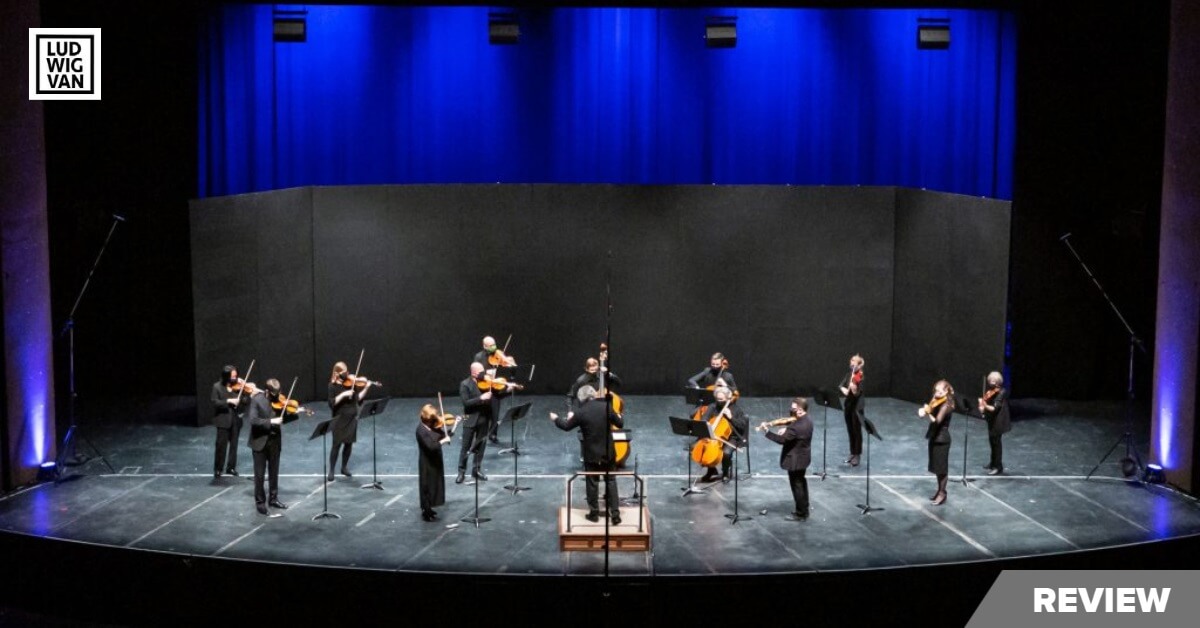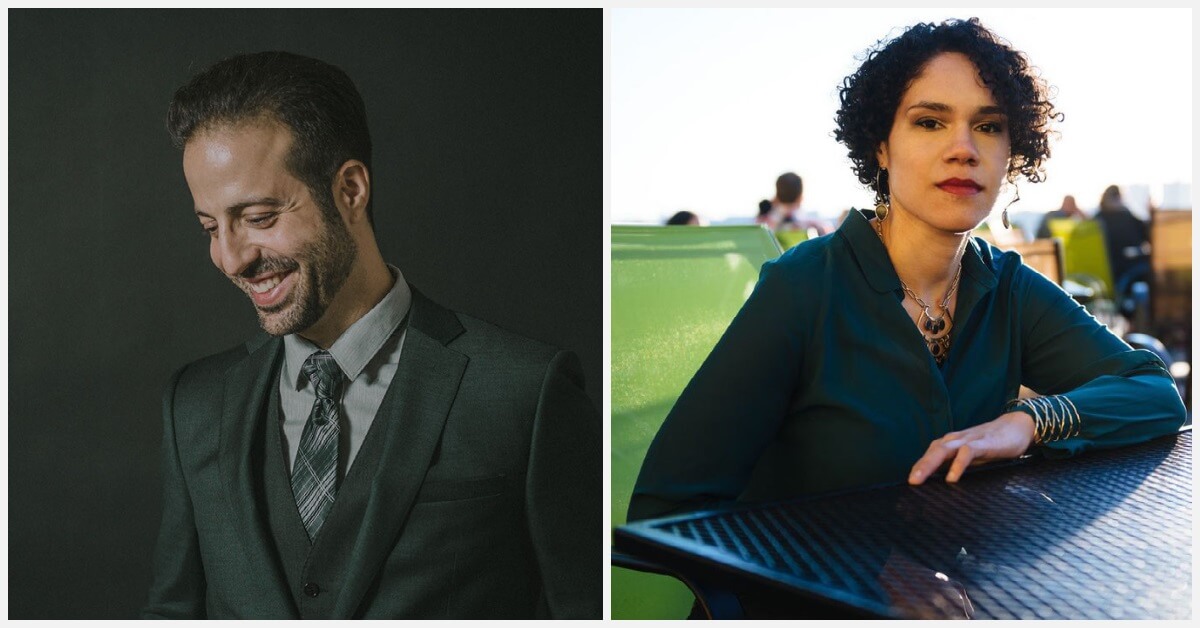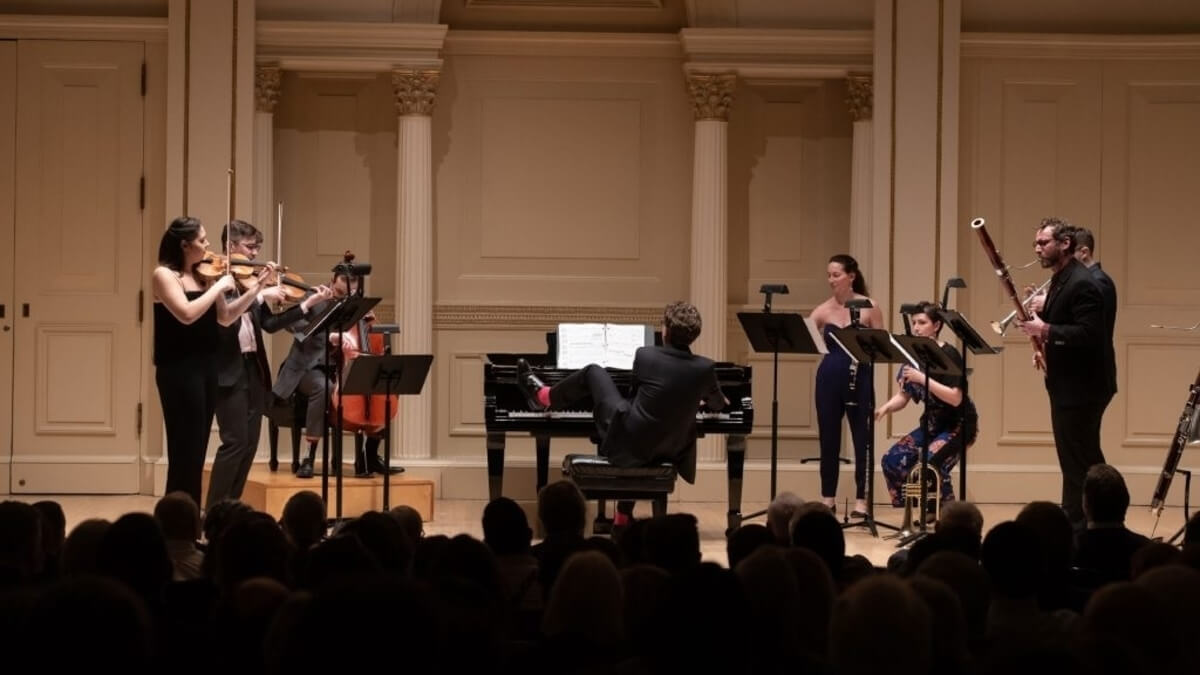
Winnipeg New Music Festival, January 23, 26 & 29, 2021
Amid today’s inestimable, all too real challenges of presenting art during a global pandemic, the Winnipeg New Music Festival fearlessly forged ahead with its 30th annual celebration of contemporary music, paying homage to its past, present, and future while also marking a historic milestone of its own. The entire event, held from January 23 to 29, was offered exclusively via livestream for the first time.
This year’s streamlined festival, helmed by WNMF artistic director and Winnipeg Symphony Orchestra music director Daniel Raiskin, who co-curates the week-long fête with WSO composer-in-residence Harry Stafylakis, featured three intimate programs in lieu of its usual bill of seven nightly programs plus additional satellite events. Two of those as festival bookends featured a skeletal WSO — all players now appearing onstage in chamber bubbles, masked, and physically distanced a chasmic two metres apart — performing live from Winnipeg’s Centennial Concert Hall stage.
The third offering showcased New York City based chamber collective Decoda Ensemble, with 11 musicians performing throughout North America — as a sidebar, curiously underscoring the centuries old, original intention of chamber music to be enjoyed as a kinder, gentler listening experience in the home.
The opening program, Lineage held January 23 opened with Jessie Montgomery’s Source Code, inspired by her study of African American artists prominent during the Civil Rights era while she purposefully explored her own ancestral roots. The one-movement piece for string orchestra features Montgomery’s own created spiritual, with bluesy wisps of melody floating between players further heightening the soulful work, apropos in these culturally sensitive times.
One of the WNFM’s four pillars and pivotal voices throughout its three decades has been the late Christopher Rouse, who also served as its distinguished guest artist in 1999. Infused with echoes of Mahler, Bruckner, Shostakovich and Sibelius, Rouse’s Supplica is a deeply pensive, at times pungently dissonant work not purporting to provide pat answers to life’s imponderables, but pose thoughtful questions as an enigmatic, compelling companion piece for his Fourth Symphony, also composed in 2014.
Another pillar is John Adams, whose innocuously titled Son of Chamber Symphony, originally commissioned by Stanford University, Carnegie Hall and the San Francisco Ballet in 2007, drives forward with propulsive energy, including heart-stopping percussive strikes. Adams’ self-described can-can finale became an evening highlight, with the players performing like banshees during this wild, deconstructed roller coaster ride into the heart of Adams’ mercurial compositional style.

As the lone Canadian on the program — and for the record, less than 1/3 of the entire slate of composers this year hail from our home and native land, not to mention the same, sobering lean percentage of women composers, despite significant inroads being made in this regard in more recent years — Montreal-born composer Samy Moussa returned to the stage, albeit virtually, with his German-titled Kammerkonzert, offering an intense plunge into his textural sound world that ricocheted between extreme registers including ear-piercing piccolo riffs, moaning winds, and strident string tremolos that clashed like swordplay.
Closing nights for many WNMFs have typically offered all-guns blazing grand finales, further bedazzling its sold out audiences with festival buzz, the calling card of what is ostensibly a full season of new music packed into one frozen week. Needless to say, those whoops, cheers and rousing standing ovations were missing in action this year, with this year’s swan song, In Disquieting Times also understandably offering a relatively subdued evening of deep contemplation and inner reflection befitting these troubled, pandemic-soaked times.
The first of those became Winnipeg-born, Juno-award winning composer Jocelyn Morlock’s Disquiet, inspired by one of her musical icons, Shostakovich. The now BC-based artist and notably Vancouver Symphony Orchestra’s inaugural composer-in-residence under the baton of its former maestro, Tovey, created a tightly wound, edgy one-movement work for string ensemble with percussion, with ghostly crotales further heightening its suspenseful tension before ultimately splintering into shards of dissonance.
Another Manitoban and of Cree heritage, Andrew Balfour’s Kiwetin-acahkos: Fanfare for the Peoples of the North, co-commissioned by the Toronto Symphony Orchestra and Manitoba Chamber Orchestra commemorating Canada 150 in 2017, celebrates this country’s expansive north while paying special tribute to the Indigenous perspective of the sky, with its title translated as “North Star.”
Another celestially-based work, New York City-based Stafylakis’ Ashes to Light the Sky, premiered in 2016 by Montreal’s McGill Chamber Orchestra led by Boris Brott, and inspired by the writings of astrophysicist Carl Sagan — the “astronomer of the people” — was billed as an exploration of “the ultimate political misuse of science,” as primordial men “imagine trying to look up at the stars through the haze of nuclear ashfall.”
The Montreal-born Stafylakis, who Zoomed into daily rehearsals and hosted pre-show chats, artist interviews and interactive post-show Q & A’s throughout the week from his NYC home due to ongoing Canada/US border restrictions, is acclaimed for creating visceral, epic-scaled works, including his unforgettable head-banging orchestral suite Weighted for American prog metal band Animals as Leaders that premiered during the 2019 WNMF. This decidedly more introspective piece alternated between lush string passages and more bristling, percussive textures, including opening snap pizzicati that cracked like whips through our digital screens. It also displays Stafylakis’ keen gift for crafting uniquely malleable orchestration, able to shape shift to loud ‘n’ proud heavy metal concertos at will, or highly sensitive chamber tone poems as this 16-minute work.
Edmonton-based composer Emilie LeBel drew on the hushed night sounds of her big city apartment, i.e. her downtown Toronto flat while a graduate student in 2009, to form the basis for her piece for string ensemble, Murmur. LeBel also displays her knack for idiomatic, textural writing. One of Murmur’s most startling effects was hearing musicians hissing whispers through their masks, further infusing the piece with mystery.
The jewel of the night became late Georgian composer Giya Kancheli’s Tranquillo — another WNFM pillar — with Raiskin’s sensitive direction of the short ode to tranquility evoking the profound serenity of Arvo Part’s soulful works. It also spoke to the maestro’s close friendship with the composer who died in October 2019.
Finally, Philip Glass’ pandemic-friendly Concerto Grosso, written for distinctive groups of winds, brass and strings, and ideally suited to smaller cohorts of musicians. Another festival pillar, the legendary American composer notably also served as distinguished guest artist during the 2018 WNMF, which also presented the world premiere of his String Quartet No. 8, among other works, performed by the JACK Quartet and co-c-commissioned by the WSO with Carnegie Hall.
The WSO musicians had their hands full this year, including performing with the unprecedented challenges of physical (and aural) distancing, and this particular performance strangely suffered from an overall lack of energy and musical glue despite its idiosyncratic, driving rhythms and hypnotic ostinato figures, the hallmark of Glass’ compositional style.

The second evening featured the Decoda Ensemble, notably Carnegie Hall’s first affiliate chamber group equally known for their community engagement initiatives. They presented a cornucopia of eight chamber works on January 26, with its 11 musicians streaming their performances from throughout North America.
The diverse program that featured solo to quartets composed by Kinan Azmeh, Brad Balliett, David Lang, Caroline Shaw, Joseph Jones, Evan Premo, Michelle Ross, and Nathan Schram also included virtual artist interviews hosted by Stafylakis, sandwiched between individual performances that added to the nearly two hour evening sans intermission.
Highlights included two works by past WNMF featured composers: David Lang’s Vent, performed by pianist David Kaplan and flutist Catherine Gregory, as well as two excerpts from Damascus-born composer/clarinettist Kinan Azmeh’s The Fence, The Rooftop, and the Distant Sea, “IV. Dance” and “V. Epilogue,” a deeply poignant work in which he seeks to capture memories of home, skilfully brought to life by clarinettist Alicia Lee and bassist Kris Saebo.
Kaplan also treated cyber listeners to Pulitzer-prize winning composer Caroline Shaw’s wonderfully witty, whirlwind piano prelude New Dances of the League of David: XVI (mit gutem Humor, un poco lol ma con serioso vibes), with another standout being Michelle Ross’s haunting Whale Song rendered by cellist Sæunn Thorsteinsdottir.
The program rounded out with DE co-artistic director/bassoonist Brad Balliett’s Oystercatcher, performed by himself, Laura Weiner on horn, Hamilton Berry on cello, and Schram on viola. We also heard Balliett’s Waterbear, Premo’s Lullaby and Polska; as well as Jones’ Soliloquy for solo bassoon. In the latter work, Balliett showed us the plaintive heart and soul of this oft-maligned orchestral backbencher, its lone, singular voice resonating through cyberspace like a cry from the depths, emblematic for these gripping, distanced times.
#LUDWIGVAN
Get the daily arts news straight to your inbox.
Sign up for the Ludwig van Daily — classical music and opera in five minutes or less HERE.
- GUIDE | Ontario Summer Music Festivals 2022 - July 1, 2022
- INTERVIEW | Sheku Kanneh-Mason On Reuniting With Family For Toronto Debut - May 2, 2022
- FEATURE | How The Royal Conservatory Avoided A Disaster - June 9, 2021



